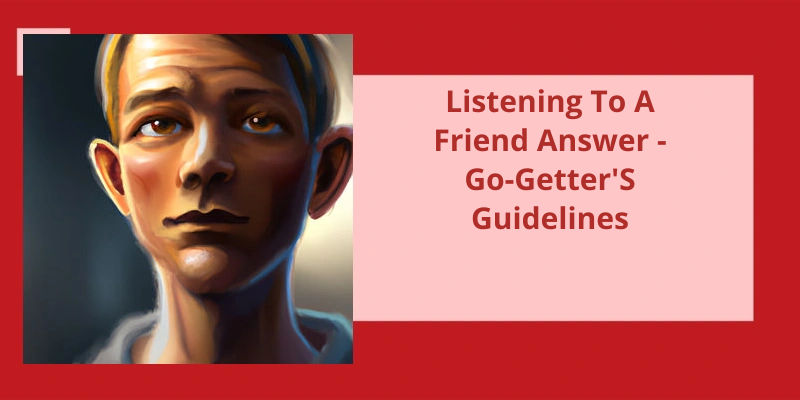Listening is a powerful tool for effective communication and has the ability to strengthen relationships, foster understanding, and build trust. When it comes to listening to a friend answer, it becomes even more important to engage in active and empathetic listening. In today's fast-paced world, where distractions are abundant and attention spans are dwindling, the art of listening has taken a backseat. However, by making a conscious effort to truly tune in and understand what our friends are saying, we can become better friends, confidants, and supporters. This article delves into the go-getter's guidelines for listening to a friend answer, providing valuable insights and techniques to enhance our listening skills. Whether it's offering a listening ear during difficult times or simply being there to share in the joyous moments, being a good listener is an invaluable trait that can make a world of difference in our relationships. So let's dive into the world of active listening and discover the transformative power it can have in our friendships.
What Are the 6 Simple Listening Guidelines?
One of the most important skills we can develop as go-getters is active listening. This means fully engaging with the speaker and making them feel heard and understood. To achieve this, there are six simple listening guidelines that can greatly improve our listening skills and foster strong connections with others.
The first guideline is to pay attention. When someone is speaking, give them your full and undivided attention. This means putting away distractions, maintaining eye contact, and actively focusing on what they’re saying. By doing so, you demonstrate to the speaker that you value their words and are fully present in the conversation.
The second guideline is to show that youre listening. Non-verbal cues such as nodding, smiling, and leaning forward can convey your engagement and interest. These gestures indicate that you’re actively listening and encourage the speaker to continue expressing themselves.
Providing feedback is another important guideline. This involves summarizing or paraphrasing what the speaker has said to show that you understand their message. It also allows for clarification if there are any misunderstandings. By providing feedback, you demonstrate that you’re actively processing and internalizing the information being shared.
Defer judgment is the next guideline. It’s important to suspend any personal biases or preconceptions while listening. By being open-minded and non-judgmental, you create a safe space for the speaker to freely express themselves. This can help foster trust and encourage deeper, more meaningful conversations.
Lastly, responding appropriately is crucial for effective listening. This means choosing your words and tone carefully to ensure that your response aligns with the speakers message and needs. It can range from offering support and empathy to providing constructive feedback or solutions if necessary. Responding appropriately shows respect for the speakers feelings and opinions and encourages further dialogue.
These skills are invaluable in building strong relationships, fostering understanding, and effectively communicating with others. As go-getters, mastering the art of listening empowers us to make meaningful connections and achieve our goals.
Strategies for Improving Listening Skills in Personal Relationships
One of the key strategies for improving listening skills in personal relationships is to practice active listening. This means giving your full attention to the person speaking and showing genuine interest in what they’re saying. Avoid distractions and make eye contact to demonstrate that you’re engaged in the conversation.
Another important strategy is to practice empathy. Try to understand the emotions and perspective of the other person and validate their experiences. Show empathy by using reflective listening techniques, such as paraphrasing or summarizing what they’ve said.
Furthermore, it’s crucial to avoid interrupting or jumping to conclusions while listening. Allow the other person to finish their thoughts before responding, and ask clarifying questions to ensure you’ve understood their message correctly.
Finally, be mindful of your nonverbal communication. Nonverbal cues, such as nodding or maintaining an open posture, can signal that you’re fully present and actively listening. Avoid crossing your arms or displaying other closed-off body language, as this can signal disinterest or disagreement.
By implementing these strategies, you can enhance your listening skills and strengthen your personal relationships by creating a supportive and empathetic communication environment.
Conclusion
In conclusion, actively listening to a friend's answer and following the go-getter's guidelines can greatly enhance our interpersonal relationships and personal growth. By showing genuine interest, respect, and empathy, we create an environment where open and honest communication can thrive. Through active listening, we validate our friend's experiences, validate their emotions, and build trust. By using the go-getter's guidelines, we encourage and support our friends in achieving their goals and dreams, fostering a sense of empowerment and motivation. Ultimately, by practicing these skills consistently, we can cultivate deep connections, foster personal development, and create an uplifting and supportive community of go-getters.






